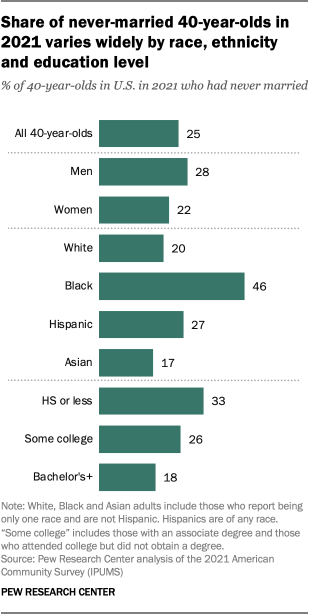A record-high share of 40-year-olds in the U.S. have never been married
As of 2021, 25% of 40-year-olds in the United States had never been married. This was a significant increase from 20% in 2010, according to a new Pew Research Center analysis of Census Bureau data.

Marriage has long been a central institution in the lives of Americans. In 1980, just 6% of 40-year-olds had never been married. But people born from the 1960s onward have been increasingly delaying marriage, and a growing share are forgoing it altogether.
The 2021 data marks a new milestone in that decades long trend.
While many unmarried 40-year-olds are living with a romantic partner, most are not. In 2022, 22% of never-married adults ages 40 to 44 were cohabiting.
The share of 40-year-olds in 2021 who had never married varied by the following demographic characteristics:
- Gender: A higher share of men than women had never married.
- Race and ethnicity: Black 40-year-olds were much more likely to have never married than Hispanic, White and Asian 40-year-olds.

- Education level: 40-year-olds without a four-year college degree were more likely to have never married than those who had completed at least a bachelor’s degree. One-third of those with a high school diploma or less had never married, compared with 26% of those with some college education and 18% of those with a bachelor’s degree or more education.
The overall decrease in the share of 40-year-olds who have married is especially notable because the share of 40-year-olds who had completed at least a bachelor’s degree was much higher in 2021 than in 1980 (39% vs. 18%). More-highly educated 40-year-olds are more likely to have married, but the growth of this group has not reversed the overall trend of delaying or forgoing marriage.
To be sure, we can’t assume that if someone has not married by age 40, they never will. In fact, about one-in-four 40-year-olds who had not married in 2001 had done so by age 60. If that pattern holds, a similar share of today’s never-married 40-year-olds will marry in the coming decades.